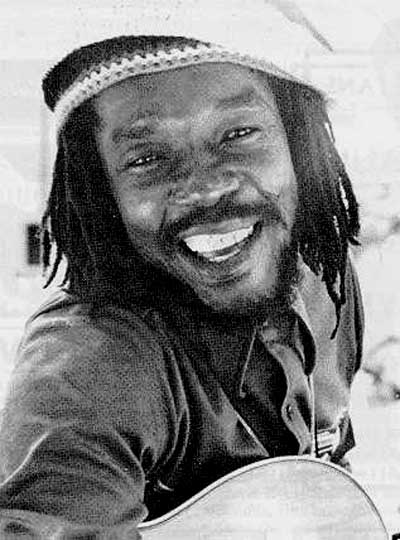Peter Tosh (Winston Hubert McIntosh)

Peter Tosh began recording and released his solo debut, Legalize It, in 1976 with CBS Records company. The title track soon became popular among endorsers of marijuana legalization, reggae music lovers and Rastafari all over the world, and was a favourite at Tosh’s concerts. His second album Equal Rights followed in 1977, featuring his recording of a song co-written with Marley, “Get Up, Stand Up,” and a cover of “Stepping Razor” that would also appear on the soundtrack to the film Rockers. Tosh organized a backing band, Word, Sound and Power, who were to accompany him on tour for the next few years, and many of whom performed on his albums of this period. In 1978 the Rolling Stones record label Rolling Stones Records contracted with Tosh, on which the album Bush Doctor was released, introducing Tosh to a larger audience. The album featured Rolling Stones frontmen Mick Jagger and Keith Richards, and the lead single – a cover version of The Temptations song “Don’t Look Back” – was performed as a duet with Jagger. It made Tosh one of the best-known reggae artists. During Bob Marley’s free One Love Peace Concert of 1978, Tosh lit a marijuana spliff and lectured about legalizing cannabis, lambasting attending dignitaries Michael Manley and Edward Seaga for their failure to enact such legislation. Several months later he was apprehended by police as he left Skateland dance hall in Kingston and was beaten severely while in police custody.
Mystic Man (1979), and Wanted Dread and Alive (1981) followed, both released on Rolling Stones Records. Tosh tried to gain some mainstream success while keeping his militant views, but was only moderately successful, especially when compared to Marley’s achievements. That same year, Tosh appeared in the Rolling Stones’ video Waiting on a Friend. In 1984, after the release of 1983’s album Mama Africa, Tosh went into self-imposed exile, seeking the spiritual advice of traditional medicine men in Africa, and trying to free himself from recording agreements that distributed his records in South Africa. Tosh had been at odds for several years with his label, EMI, over a perceived lack of promotion for his music. Peter Tosh also participated in the international opposition to South African apartheid by appearing at Anti-Apartheid concerts and by conveying his opinion in various songs like “Apartheid” (1977, re-recorded 1987), “Equal Rights” (1977), “Fight On” (1979), and “Not Gonna Give It Up” (1983). In 1987, Peter Tosh seemed to be having a career revival. He was awarded a Grammy Award for Best Reggae Performance in 1987 for No Nuclear War, his last record.
On 11 September 1987, just after Peter Tosh had returned to his home in Jamaica, a three-man gang came to his house on motorcycles and demanded money. Tosh replied that he did not have any with him but the gang did not believe him. They stayed at his residence for several hours and tortured him in an attempt to extort money from Tosh. During this time, Tosh’s associates came to his house to greet him because of his return to Jamaica. As people arrived, the gunmen became more and more frustrated, especially the chief thug, Dennis “Leppo” Lobban, a man whom Tosh had previously befriended and tried to help find work after a long jail sentence. Tosh said he did not have any money in the house, after which Lobban and the fellow gunmen began opening fire in a reckless manner. Tosh was shot twice in the head and killed, while several others were wounded and killed including herbalist Disk jockey Jeff ‘Free I’ Nixon and Wilton “Doc” Brown Tosh’s common law wife, Andrea Marlene Brown, his drummer Carlton “Santa” Davis, musician Michael Robinson and Jeff “Free I” Dixon’s wife, Yvonne were wounded during the robbery. According to Police Commissioner Herman Ricketts, Dennis “Leppo” Lobban surrendered and two other men were interrogated but not publicly named. Lobban went on to plead innocent during his trial, telling the court he had been drinking with friends. The trial was held in a closed court due to the involvement of illegal firearms. Lobban was ultimately found guilty by a jury of eight women and four men and sentenced to death by hanging. His sentence was commuted in 1995 and Lobban remains in jail. Another suspect was acquitted due to insufficient evidence. The other two gunmen were never identified by name. It is said that they were killed in a daylight gun battle in the street.
Born
- October, 19, 1944
- Grange Hill, Jamaica
Died
- September, 11, 1987
- Kingston, Jamaica
Cause of Death
- gunshot wound
Cemetery
- Peter Tosh Mausoleum
- Westmoreland, Jamaica



